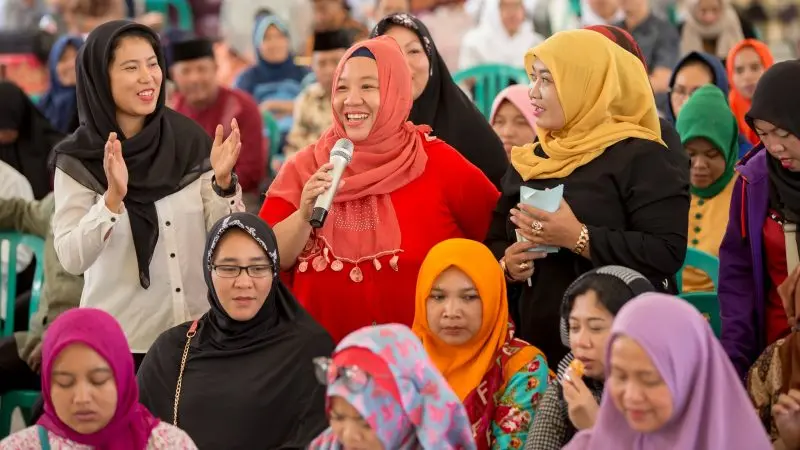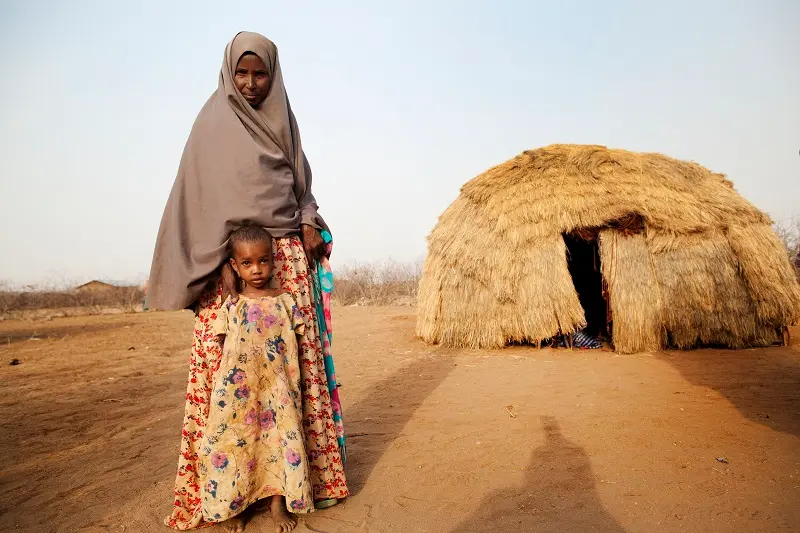The Muslim world, and its religious leaders, have a duty to empower women to play crucial civil society roles if climate change is to be slowed and – possibly even reversed, writes Dr Mohammad bin Abdulkarim Al-Issa.
Dr Al-Issa is Secretary-General of the world’s largest Islamic non-governmental organisation, the Muslim World League (MWL), which comprises a global network of Islamic religious scholars spanning 139 countries. Dr Al Issa is also one of the world’s leading and most influential Islamic clerics and made global news after making an inter-faith trip to Auschwitz and meeting Pope Francis.
Famine. Global refugee crises. Unprecedented death tolls. That is what could await the Muslim world.
This year’s Earth Day comes in the shadow of an IPCC report that shows the window to prevent global temperatures from rising above 1.5°C (the widely accepted point of no return) is closing – guaranteeing some Islamic world countries becoming uninhabitable within decades.
Climate change is here. But there is still one vital resource that can help temper its destructive effects – women.
The Muslim world, and its religious leaders, have a duty to empower women to play important civil society roles if climate change is to be slowed and – possibly even reversed.
For too long Muslim women have been relegated to domestic roles, with little say in the future of their homes and children. All legitimised by distorted readings of scripture and outdated cultural practices.
In the WEF’s 2021 Gender Gap report, an astounding 24 of the bottom 30 countries with the widest gender gaps are Muslim-majority.
This, to me, is outrageous. Not only as Secretary-General of the world’s largest Islamic NGO but as a Muslim. When I think of the environmental calamity that will inevitably befall our ummah should we fail to relinquish such destructive doctrines, it is even more troubling.
Women, after all, are critical to the region’s food supply, accounting for 50%-70% of the agricultural workforce. Their extensive knowledge of agricultural infrastructure enables them to navigate and guide environmental policymaking. In addition, Global South women have proven to make more efficient use of resources like water, food, and fuel – key components of climate action.
Therefore, women in the Islamic world have invaluable perspectives on how climate change is unfolding, how we can best prepare for it—and even what we should not do in response. Unfortunately, those crucial perspectives often fail to reach policymakers because women simply do not have a seat at the table.
But it is not only what women know—but how they act on what they know – that matters.
UN Studies on climate action have proven that women in the Global South address climate related issues by focusing on holistic community engagement which “results in greater responsiveness to citizens’ needs and often increases in cooperation across party and ethnic lines, generally resulting in sustainable outcomes.”
In short, women in the Islamic world must play a pivotal role in confronting the Islamic world’s climate crisis.
In practical terms, that means women from Muslim world nations occupying important roles in developmental organisations, being at heart of the executive programs and climate plans of the Islamic world, and the next generation of young girls across the Islamic world being educated on climate science and civil society engagement.
The female population, after all, is one of the lungs of society – and society must breathe with both lungs.
There are signs the Islamic world is beginning to act. Take, for instance, the much-vaunted Saudi and Middle East Green Initiatives launched by the Saudi Crown Prince in 2021. It made global headlines for aiming to plant 50 billion trees across the region and has already raised vegetation cover across the Saudi Kingdom. But those efforts have also had a particular focus on empowering Saudi youth and women in the climate action process.
Whilst this is undoubtedly a positive sign – much more must be done. Indeed, in the face of an existential climate disaster, Islamic religious authorities have a special obligation to address the distorted dogma that still stands in the way of women’s empowerment in the Muslim world.
Thankfully, there is powerful religious precedence for doing so.
Take the Charter of Makkah, one of the most critical documents in recent Islamic religious and jurisprudential history. A universal declaration of rights and values agreed upon by over 1,200 senior Islamic scholars and 5,000 Islamic thinkers from 139 countries, the document strongly references women’s empowerment in civil society and explicitly calls for women not to be marginalised in public life.
There must be actionable steps to implement these sentiments in Muslim world countries, but make no mistake – the Makkah Charter is a massive milestone in leveraging the highest global Islamic religious authorities to challenge the toxic stereotypes that have long held women back in the Muslim world.
And for very good reason:
Not only did the Islamic faith empower women from its inception, but Muslim women were an active, vital, and invaluable part of Islam’s foundation. The faith simply would not have thrived as it did without their contributions. Take, for example, the wealthy independent businesswoman, Khadija, who later married the Prophet Muhammad, Peace Be Upon Him.
Her financial resources and personal strength sustained the young Muslim community at a particularly vulnerable time. And the Prophet’s wife, Aisha, is the source through which much of the Islamic legal tradition developed.
She is the backbone of so much of our religious scholarship.
And that hardly addresses the numerous Muslim women who fought for the community, sometimes literally, in its most precarious early days, as well as those who taught Islam, preserved Islamic texts, endowed religious institutions, and served as benefactors for arts and culture across our history.
Fortunately, empowering women to play a more notable role in tackling climate change requires not abandoning who we, as Muslims are – but remembering who we were meant to be in the first place.
Source
Image Source
Tags: Women are the missing key to tackling climate change in the Muslim World



